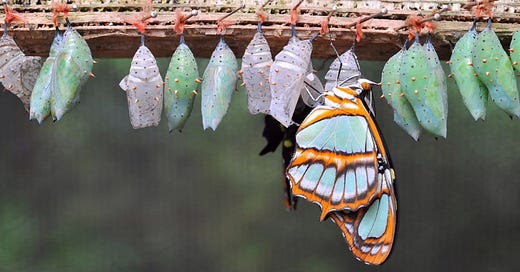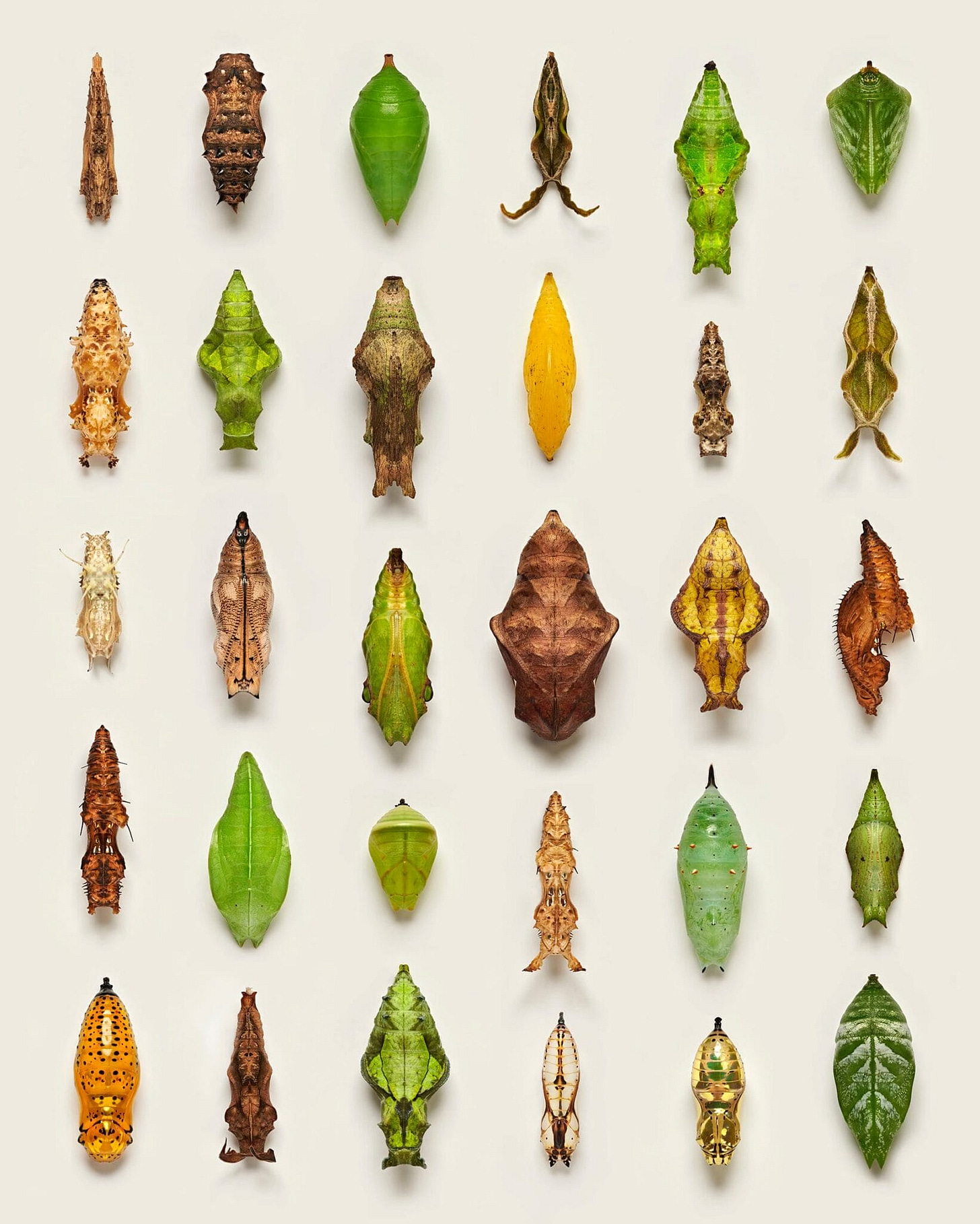Matrescence Changes Everything
We have a term for adolescence—why don’t we have one for becoming a parent?
I’m new to the Charlotte, NC area, so I’ve obviously already started a book club. Reading is one of my favorite hobbies in the world, and my second favorite hobby is yapping with people about books, so this was truly inevitable.
However, because I’m trying to build a private practice caseload in a new city, I am also currently in a season of networking my ass off, so I love any excuse to meet with like-minded professionals and bond over our personal and professional obsession - reproductive health.
Enter: “The Perinatal Pages.”
It’s a book club/networking group for fellow perinatal maternal health professionals, where we can get together and talk about books related to perinatal health. (I mean, what's not to love?)
Our first read was Matrescence: On Pregnancy, Childbirth, and Motherhood by Lucy Jones, a science and health journalist from the UK.1 The crux of the book was an exploration of the spiritual, mental, emotional, social, and physical changes that a new mother experiences.
You guys. This book was excellent. Part social commentary, part journalistic reporting, part personal memoir—when I tell you that this book had a chokehold on my attention span, I am not exaggerating. For weeks, my husband would be happily minding his business around our home as I routinely exploded with exclamations of: “BABE - I have something new to tell you about Matrescence!”2
So if you have any additional questions about matrescence by the end of this essay, just reach out to my husband because he’s now the second expert in our home. Bless his heart.
In case you have not heard of matrescence, it’s essentially a word used to label the season of profound changes that a woman experiences between pregnancy, childbirth, and the early years of her child’s life.
Coined by the medical anthropologist Dana Louise Raphael in the 1970’s, matrescence honors the rite of passage of becoming a mother.3
A rite of passage for motherhood - what a concept, right?
Establishing a rite of passage for motherhood would mean that the transition into motherhood would be labeled and defined and honored, not ignored, dismissed, or rushed. Space could open (socially, emotionally, physically, spiritually) to allow for transformation from one iteration of yourself into a new one.
I want to note that this term was specifically designed for cisgender women who experience a physical pregnancy and childbirth. Maybe it would serve us to broaden this concept to make it more inclusive. All parents go through a profound developmental season when they become a parent, whether or not they physically bear a child, and whether or not they identify as a mother.
These experiences are actually often sidelined, and can be harder to validate and acknowledge these profound changes, and this can just make that experience harder.
Parents who become parents without giving birth absolutely experience a massive developmental, physical, social, and emotional change–it’s just different. (I’m looking at you, dads who experience postpartum mood & anxiety disorders. I’m also thinking about parents who adopt or utilize surrogacy.)
At the same time, the societal expectations and narrative around “motherhood” and “fatherhood” are wildly different, so maybe it is helpful to maintain some distinction. We won’t be able to solve this complexity here, but I think it’s important to acknowledge.
Experts disagree on how long matrescence technically lasts. Some argue that since the work of becoming a mother and adapting to the myriad of changes is a lifelong process, matrescence never ends. Others note that the most significant development involved in matrescence occurs over the first six years of a child’s life, as the child continues to gain more independence and become school-aged.
Regardless of how long matrescence technically lasts, it’s generally agreed that this transformation is unique to every mother, and that she experiences through a new season of matrescence with every pregnancy and childbirth experience. With every new child, every mother adapts and becomes a slightly different parent.
The only other stage of human development that prompts this many seismic changes is adolescence. I don’t know about how your adolescence went, but I would imagine it wasn’t exactly a waltz through sunshine and roses.
At least we have a label for that complete and utter hormonal shit show of nonsense and weirdness. And it’s not even a very rude label. Ideally, we lean in without judgment or impatience to help our loved ones navigate adolescence. It’s hard and overwhelming and it feels like nothing is stable, but it is normal. Nobody expects a child to make it through 7th grade completely unscathed—it’s going to get wild there for a bit.
Meanwhile, when a woman becomes miraculously pregnant, and all of her hormones, organs, and bones rearrange to accommodate the creation of a new human inside of herself; and she births this new life into the world, whether by sheer willpower and muscle or through medical intervention and immense courage (or all of the above!); and when her boobs leak, and she barely sleeps at all for days on end; and her hormones plummet, her hair falls out, her stretch marks remain, her relationships overhaul and transform, and her purpose in the world internally shifts—we expect her to bounce back pronto, seamlessly transform into an adept and capable mother (who freaking loves being a mother at all times!) and not make it that big of a deal.
And this is all assuming that she was able to bring home a live, healthy baby after her pregnancy and birth experience and did not sustain any major health trauma. We have even less language and awareness to know how to help new parents navigate those things.
As someone who professionally sits daily as witness and mental health guide to people navigating matrescence, having a label for this season of life seems to provide immense validation for all of the changes that take place during and after giving birth.
Your whole world changes when you become a mom, and you won’t be the same person you were before you had a baby. And this development can look profoundly different person to person.
It makes me think of butterfly chrysalises (stick with me here). This process of transforming from caterpillar to liquid to butterfly happens to every member of the insect order Lepidoptera, but each chrysalis is unique.
The unique yet shared experience of matrescence is similar. The way that one mom experiences her shift into parenthood is distinct from another mom, but they all experienced it at one point in order to become a mother. Furthermore, they probably needed similar but different things in this season of change.
According to Jones (2024):
“One of the questions I asked [mothers] was: ‘What would have helped your matrescence (journey into motherhood) and experience of new motherhood?” The top answer was ‘opportunities for honest conversations about the reality of motherhood’ alongside ‘more affordable childcare.’ The other highest voted factors were being able to rest and recover more after pregnancy and childbirth, longer leave for partners and cultural rituals to acknowledge the transition.” (p. 204)
We can’t truly control all of the things that could happen during pregnancy, childbirth, or postpartum, but we can control how much we make space for new parents to talk about their experiences.
My hope is that by embracing the idea of “matrescence” (or the more inclusive word that we will brainstorm together!), we will be able to better honor and acknowledge this season, and to bring awareness to the complexity of becoming a parent.
If you are a parent, I’d love to get your thoughts about Jones’ question: “What would have helped your [matrescence/patrescence]...and experience of new [parenthood]?”
If you are not a parent (like me!), what does it mean to you to have a label for this season of life? Does it impact the way you feel equipped to care for your community in their transformation into parenthood? Does it help you prepare for any future experiences of parenthood?
Disclaimer: This essay is intended for educational and informational purposes only. Reading or engaging with this content does not constitute therapy, nor should it be considered professional advice or a substitute for therapy. Everyone’s experiences are unique, so what’s shared here may or may not resonate with you. For more details, please review the full disclaimer on my About page before reading. To learn more about my clinical work, please click here.
I will tell you from the jump, the cover of the US version of the book is not…great. It looks a bit like a textbook and it made me feel very sad for both Lucy Jones and my Kindle lockscreen.
You should pray for him as I am currently in the thick of Beth Allison Barr’s new book, Becoming the Pastor’s Wife: How Marriage Replaced Ordination as a Woman’s Path to Ministry. I am virtually insufferable at this point, it’s that thought-provoking.
Fun fact: she also established the word “doula”! We love her.







As someone who loves working with the adolescences & who isn’t a parent, I love the language of ‘Matrescence’ to know there is such a shift of development into parenthood! ☺️ you’re crushing these articles, Ginny!
Proud to be an honorary member of The Perinatal Pages! 📚📖